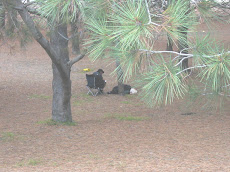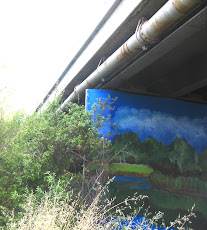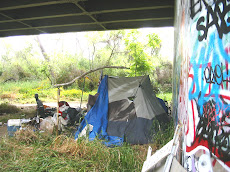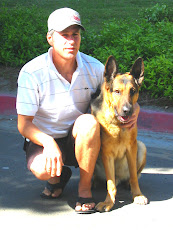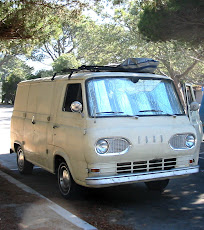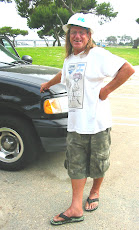It is harder than you think to stand around all day and ask people for money.
I tried it recently.
Having considerable experience in sales and fundraising, I thought I could do a more creative job of panhandling than the homeless folk out at the intersections. I did not want to look homeless or sad. I did not want to appeal to pity. No, I wanted to fundraise, so I took my cause to the Embarcadero and stood amid the seaside restaurants, ships at dock, the jewelry and tie-dye vendors, and pedi-cabs.
It was a wonderful idea: I would give away free hugs and offer people the opportunity to give money to someone less fortunate, meaning me. My sign read, "Free Hugs & Donations to the Homeless." I was dressed well, but casually. I wore makeup and made sure my nail polish was fresh. I smiled and asked passers-by in a friendly tone if they needed a hug. I even got into a rhythm I could ride for a while.
Frankly, I had to stay "up" and to do whatever it took to get there. While I know the impact sugar has on my body and keep its consumption to a minimum, on that day, before driving downtown to start a new occupation as panhandler, I ate a few cookies. I even thought the "sugar high" would empower me, and maybe it did, at least, for the time it took to get to the Embarcadero.
Once there, I just could not get out of the truck. I would inch a little toward the door, but then clutch the steering wheel and pray. Finally, I phoned a friend: I asked him to help me get out of the truck so that I could do this thing. He coached me out of the vehicle and along the promenade until I found an amicable young vendor whom I asked about sharing her piece of the sidewalk. I felt better now. I had made a friend.
So that was my start. I spoke to as many people as I could, and there was still a little sugar in my blood. My sales spiels went like this: "Do you need a hug today?!", "Hi, hugs are free!", or "Would you like a hug?" I collected $14 for my efforts in close to three hours, but it was a Thursday. That money equaled the time and kindness of nine people and paid for my gas and the parking meters. I made $3.
Not much, you think, but any money will spend.
Nonetheless, it took a lot of energy to keep from crashing, from giving in to a sense of vulnerability that made me anxious, best described as feeling as though my brain were seeping out of my skull and making me slightly light-headed. I suppose it is also known as fear, but I could not understand why, with so much fundraising experience, I would react so severely to doing something so benign.
After all, I was deflecting the harshest judgments that might come from the public by posing, not as homeless, but as an agent on behalf. I was even giving something in exchange for a donation. Moreover, I am not intimated by rejection, being ignored, or what other people think, at least, not usually; but, for some reason, I was not in top form, and I was scared.
On my way home, that is, back to my spot on the Bay, it occurred to me that I was asking a lot of people. If a person heard me at all as opposed to ignoring me, there were numerous little calculations that went on in his mind, just as there are in my head when someone makes a request of money from me. Even family is funny about money.
When my father was alive, he would give me money at times because he figured I could use it. However, if I asked for money, he seemed to need to think about it. One day on a visit to my parents' house, I expressed the need for a vehicle and wondered if they could help with a down payment. Of course, my father would think about it. As soon as he left the room, however, my mother launched into a surprising, scalding lecture I will call, "Your Father/My Husband."
In it, my mother outlined her concerns for my father as a wife. I could understand what she said, but she was also pulling rank, and her position, of course, was more important than mine. While family relations certainly intersect, I never imagined any of them to run at cross purposes or to invalidate another. Naively, I suppose, I thought they coexisted. However, in so many words, my requests for money were working my father to death; and he needed to retire. My father (and his money) belonged to her, and I needed to . . . well, get lost. I never felt more motherless. Worse than that, the ground of my existence fell away, and I was as far from earth as a lost kite. I seemed to float, disembodied, for days.
I was killed, but I wasn't dead.
Many years ago, I read a book by a man named Norman O. Brown called, "Love's Body." These days, I would tend to agree with detractors that his analysis is too extreme and so reductionistic as to lack substance, but much of his understanding of culture and neuroses, like Freud's, is undeniable. Money, for example, is a stand-in for love and carries a hefty, symbolic load. Money, like love, gets twisted, its exchanges and relationships tortuous; but there is more to it.
My mother's diatribe might have been a simple equation, as much about her need for love and security as it was about money. However, apart from the emotional complexities, the fact of the matter is that we cannot spend love. Love has no economic power. Love will not pay the rent, buy food, or put gas in the truck. As romantic as I tend to be, I am forced to acknowledge the overwhelming power of money; and I don't like it.
Money has come to have an obscene, inordinate importance in my life. It gets more attention than anything or anyone else. I am absorbed in joh hunting in order to get money. I am preoccupied daily with husbanding what little I have left of it, which determines where I go and what I can do. My life is completely circumscribed by money, and there is not one problem I have that could not be cured by having more of it, sad to say.
Money is the life blood of our culture. We need it. We have to have it. When I ask those people on the promenade at the Embarcadero for money, I am asking them to give up what they also need. I could easier ask for oxygen from their lungs or for them to open a vein because money is dearer, more volatile, and more critical to our daily lives. I am asking them to give up some of their means of survival to me.
How did we come to this?
We are in a shameful place. We must admit that money is more important than love and far more real than God. We have to admit that we are neurotic about money, even if we hate what it does to us and feel that we cannot change it. We have to admit to a sickness around money that destroys our relationships to other people. We have given to money the place that God, love, and other people should have in our lives.
We each also need to admit our basic poverty. Nearly all of us has to work or find a government program to support us. I don't know anyone who is a scion of one of the wealthy, powerful, and controlling families on the planet --- and neither do you. The gist here is that you are potentially as poor as I am, and you can as easily lose your footing. It only takes one wrong step, but you will not know it is a misstep until the money starts to run out;that is how it goes.
Let us start, at least, with being honest, and then let's talk about what else we might do besides basing most everything of any importance on the exchange of money. To prove to yourself the necessity of such an examination, do an exercise of listing the accidents and tragedies in your life that might have been avoided with more money and think of what kind of alternative might have been prophylactic. For example, had you been living in closer proximity to dear friends, say, or in a communal setting where there are more occasions for fellow-feeling than what living as an isolated monad in an urban high-rise apartment (or as a nuclear family in a suburb) can provide, you might still have _____.
We can dream a little and imagine the doctor or veterinarian living next door who would accept a few dozen eggs for a house call. Perhaps you would enjoy living like the Amish (except you are not Amish, but you get the idea) among people with whom you could entrust your life and whose friendship and deeds not only help you along, but inform your character. You become a better person by association.
Finally, if this little drill does not convince you that you want and need an alternative to the money culture, take a drive to a spot where the homeless panhandle and remember that these people were not always where you see them today. Take a moment to notice your thoughts about them --- and the fear.
How to Wash a Weighted Blanket at Home
-
That comforting weight pressing down as you drift to sleep has become
essential—but after months of nightly use, your weighted […]





